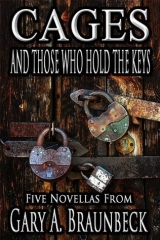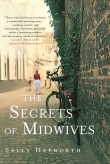
Текст книги "Cages and Those Who Hold the Keys"
Автор книги: Gary A. Braunbeck
сообщить о нарушении
Текущая страница: 23 (всего у книги 31 страниц)
3
Place two fabrics right sides together, making sure to rotary cut strips the width of the square template you are using; if the strips weren’t compatible when you cut them, do so now, layering them, and making individual alterations as necessary in order to achieve conformity.
* * *
The house of her childhood stank of grief; even from outside, she could smell it. She slipped her key into the front door lock and held her breath, anxiously aware of the sound made by the October leaves as the wind scattered them across the pavement; the dry whisper of sorrow, the crackle of old guilts trying to step out of dank corners and pull her in with the stab of twig-fingers.
It wasn’t your fault you missed the funeral, she told herself, hoping to believe it. Alan will understand.
She swallowed, released the breath she had been holding in since pulling up, felt her skin tingle with the bleak cold of descending night, and walked inside. Closing the door, she started slightly at the sound of the gas furnace snapping on, then removed her coat and tossed it into an empty chair.
Although it was barely 7:15 the interior of the house held layers of blackness that deepened with every step she took. She longed to be back in Los Angeles, but she had a responsibility to her brother.
Responsibility. It seemed like such a corrupt word right now. Alan had given over most of his youth to the responsibility of caring for the family; keeping the house clean, doing the laundry, the cooking, shopping for groceries, never moving out because that would’ve meant having to face the world without the security of a family– something Alan, for all his good intentions, could not live without. He had always been terrified of other people; it was amazing to Marian that he’d ever been married.
Next to the front door was a table that held three glass bowls filled with goodies for the trick-or-treaters; two were overflowing with candy, the third contained—
– she felt a shiver, shook it away—
– pumpkin seeds. Even now, with Dad less than a week in his grave, Alan still held fast to the family traditions; Dad always gave each beggar a handful of pumpkin seeds so they could plant them and grow their own jack-o’-lanterns for next year.
“Alan?” she called. When there was no answer, she walked into the living room. Ice formed on her spine as she saw what was draped over one of the recliners.
The stale aroma of a dead woman’s perfume enveloped her as she leaned down toward her mother’s old housecoat. It was arranged in such a way that Marian almost expected to see Mom descend from above, slip neatly into it, and ask that the television be turned on, she’d had a long day and was tired and wanted to see her shows, please.
Marian’s faded and discolored First Communion dress was arranged on the couch so that it faced the television, Grandpa’s old but well-kept three-piece (what he called his “church suit”) was in the reading chair in the next room, a book on its lap, the light turned squarely on the open page.
“Alan? It’s me.”
No response.
She headed for the kitchen, stepping over innumerable pizza boxes and fast-food bags along the way. Her foot pressed down on something that was either growing brittle and stale or softening in decay; all she could be sure of was that it crunched under her foot and then squirted something thick and warm. She leaned against the wall and shook her foot until the muck fell away from the sole of her shoe, shimmering, landing in the center of long rug in the hallway. Leaning down, Marian saw that what she thought was light playing glissandos across its surface was actually a group of blowflies fighting for a prime location. She pulled in a deep breath, covering her mouth with her hand as she continued to the kitchen.
The table was cluttered with dishes holding the remnants of meals begun but never finished, now teeming with tiny crawling things she didn’t want to look at. The sink was filled with various pots and pans, their exteriors badly scorched, some of the burnt black flecking away and mixing with the off-white, fungal-looking matter that floated on the surface of the still water, bloating the moldy bits of food that sucked in the water like sponges.
The Alan she remembered would never have allowed the house to disintegrate like this.
She thought she heard a muffled sound somewhere nearby, then something small and sticky squirmed up her calf. Marian let out a sharp cry of revulsion and batted it away, then returned to the living room and its collection of familiar outfits waiting for occupants. “Alan? Come on, this isn’t funny. Are you here?” This was bad enough. Upstairs was worse.
Grandma’s favorite nightgown was spread upon the bed in the guest room, a Bible open next to the emptiness reaching from its right sleeve, a glass of orange soda sitting on the night stand next to the bed so she could have a drink if she was thirsty. That was always Grandma’s nightly routine.
The bathroom was unspeakable; great smears of what must have been rust covered the inside of the bathtub, the toilet lid was up, the rim of the bowl nearly overflowing with waste, and the sink looked to have been recently vomited in. Underneath everything was a scent of copper. The cumulative stench made her gag, but she managed to open the medicine cabinet above the sink and remove what she needed to clean and dress the wound on her hand, which she did out in the hall.
But the worst thing, the most terrible thing, was in Alan’s old bedroom.
On the bed lay his ex-wife Laura’s black silk robe, the sash still around its waist, opened to expose the bright red bra and panties arranged in their proper positions—
–and the glistening, well-used, wet indentation of the mattress under the crotch of the panties, as if—
–god, no. Alan would never do something like…like that.
Brother, she thought.
My brother.
What’s happened to you? Where are you now?
Marian shivered.
All through the house were the garments of the dead, the almost-forgotten, the moved-aways and just-lefts, awaiting someone to wear them, each carrying the scents of those who once did. Back downstairs, Marian debated whether to continue searching the house or just grab her coat and cut her losses. Something winked at her from the living room. She turned toward it. It winked again, bright and fiery. “Alan? Alan, please answer me if that’s you.” “Over here.” Though barely more than a whisper, his voice nonetheless startled her.
As her vision adjusted to the darkness, she saw her brother for the first time in what seemed an eternity; not a savior born under Bethlehem’s star, not possessing the greatness that led other men to become leaders and poets and visionaries, not a man who wanted to change the world or even harbored the abilities to do so; just a son, a brother, a fine boy, a decent enough man who’d brought no shame to his family’s good name, who’d studied for passing grades in school, who’d tried to build his own life with a fine woman by his side to love him, but then came the day she didn’t love him anymore and so left, and with her his will to believe himself special in any way.
He was sitting very still, watching the cigarette between his index and middle finger burn down until the heat threatened to singe his flesh. He was wearing an old baseball cap, its brim turned toward the back of his head like a baseball catcher without the mask. He was a man she barely recognized– hair too gray for his thirty-three years, eyes that were dark and hopeless, blueblack crescents underneath, lines etched so deeply into his skin they looked like cracks in plaster; he looked as if he’d crumble into dust if shaken hard enough.
From outside came the cries of “Trick or treat, smell my feet, give me something good to eat!”
Alan turned his head toward the gray of evening that swept in from a wide part between the curtains over the only window in the room. “What? Did you expect to find me holed-up in the john weeping endlessly into a cracked mirror?” He took along drag from the cigarette.
Marian followed his gaze.
We put a light in the window for you.
There was, indeed, a light there; a big, beautiful jack-o’-lantern, facing outside, the candle within burning brightly, welcoming lost children home. Why hadn’t she noticed that when she was on the front porch?
Because it wasn’t there, came the answer.
“Are you here because you want to be,” asked Alan, “or because Boots called you?”
“Because Boots called me.” “Boots” was their nickname for Aunt Lucille, their dad’s sister, for as far back as they could remember, though neither of them could have told you why she was called that.
Alan gave a short, empty laugh. “An honest one. I figured it was either Boots or Laura. God bless ‘em both.” He took another deep drag as he stared into the dim of fast-approaching night meandering in from the large window at the front of the house, bringing with it a grayness that did not so much cast shadows as rearrange them to suit the feelings of the thing that looked out from behind his eyes.
“I killed a man last night.”
Marian heard the words but did not allow them to register. She took a deep breath and crossed toward her brother. “Alan, listen, I know you haven’t been well, Laura told me, and I—”
“I really did it, you know. I really did. It helped. It helped a lot.”
Marian knelt down, took away the cigarette and crushed it in the ashtray, then held Alan’s hand between both of hers. “You look like hell. You need to get some sleep.”
“Did you say hello to Jack? He’s missed you quite a lot.” Alan adjusted the baseball cap, then turned on a small table lamp, the light revealing Jack slumped on the couch, his legs spread wide and twisted, his arms akimbo, the glow of his inner-candle fire nearly extinguished. He looked no different from a dozen other homemade figures on a dozen other porches tonight.
Except that he was still wearing Dad’s shirt.
Marian was too shocked to react right away.
Between Jack and her First Communion dress lay a thick, neatly-folded coverlet, its patchwork surface a mosaic of colors and shapes.
The Story Quilt, a family heirloom passed down from nearly a century-and-a-half ago, a perpetual work-in-progress; through various descendants to her great-grandmother to her grandmother to her own mother, the Story Quilt had always been a constant in Marian’s life. Her mother had hoped Marian would continue working on it when the time came. Marian shivered at the thought; Mom had been working on it the day she’d suffered the stroke that would kill her within a few hours. Marian couldn’t bring herself to touch the damn thing after that.
A click, a hiss and a hum; the distinctive noise of the television coming on, the picture coming into focus, the static fading out of the speaker as the sound of some country music program faded in.
She looked at her brother. He was not holding a remote control.
Because the set never had one.
“Seven-thirty,” said Alan matter-of-factly. “Time for Hee-Haw.”
Marian balled her hands into fists, feeling her knuckles crack under the pressure. Hee-Haw had been her parents’ favorite program.
“Come on, Alan. I’m going to take you back to my hotel room, get you cleaned up, then we’re going to get something to eat, and then you’re going to get some sleep. When you wake up we’ll finalize details here, and you’ll come with me to L.A. for a while.”
“I can’t leave. The family depends on me.”
Only now did she notice that Alan was wearing Dad’s favorite pajamas, the gray ones with the white and blue diamond pattern. A small bloodstain near the crotch had dried and stiffened.
Don’t say anything, she thought. Not yet.
And don’t think about that thing sitting on the couch behind you.
Alan smiled, a crooked smile that held some residue of the brother she remembered. “I’m sorry, Sis,” he said, sitting down at the table. “I suppose I ought to explain things.” He took hold of her shoulders. “Look at you, so nervous and frightened. Did I do that? I’d apologize for scaring you but, after all, it’s Hallowe’en. Don’t go anywhere, I’ve got something to show you. It was going to be a surprise from Dad, but....” He walked over to the television and pulled the cover off a new VCR perched atop the set. “Dad bought this not too long ago, after you got that national perfume commercial. He taped all of your commercials and those cop shows you did bit parts on. He was really looking forward to your sitcom pilot next month.”
Marian was silent. For most of her adult life Dad had never said anything about her chosen profession, never given the smallest hint that he was proud of her accomplishments. She closed her eyes and tried to imagine her father sitting alone in this room, watching his daughter over and over as she sprayed herself with perfume or ran screaming from make-believe thugs. Would he have done all that if he hadn’t been proud?
Why didn’t you ever tell me? she wondered.
The doorbell rang, followed by a children’s chorus: “Trick or treat!”
Alan raised a finger to his lips, signaling silence, then rolled up the sleeve of the pajama top, revealing the dark-stained bandage around his wrist.
The bell rang again, followed by insistent knocks. The children giggled.
“Just a minute,” called Alan, walking over to the slumped figure of Jack Pumpkinhead, whose light was nearly gone. Alan grabbed Jack’s stem and lifted the top off, then ripped the bandage from his arm.
“W-what’re you doing?” said Marian.
“Jack needs a recharge. I can’t deny him a drink when he needs one.” Alan bit into his wrist and tore away a large, crusty scab, freeing his blood to drip into Jack’s head.
The blood ignited Jack’s inner flame, a brilliant flash of orange-red that sent a chill through Marian. She found herself staring at an exposed patch on the quilt, trying to remember when Mom had made it; she stared at it because as long as her gaze was elsewhere, she wouldn’t have to acknowledge what was happening in the periphery, wouldn’t have to admit that she wasn’t imagining it, that Jack Pumpkinhead was rising off the couch, towering almost seven feet, reaching for his stem-cap.
So she stared at patch on the quilt, remembering...
* * *
High school was a breeze for Marian. Girl’s Glee and Drama Club her sophomore year; Cheerleading Squad, Concert Choir, and Acting Ensemble her junior year, Pep Squad Captain, president of Dram Club, Swing Choir, and both the Homecoming Court and Prom Queen her senior year. If anyone’s high school years could be called dream-perfect, they were Marian’s. In those three years her sense of balance and security remained; every time she looked into the faces of her parents and brother, that expression of pride was there. A few times it bothered her that there seemed so little she could do to help her family, but those feelings quickly vanished when she told herself that she was doing everything she could to make them proud of her and that should be enough. She was only human.
A few weeks before graduation she was ecstatic to find she’d been granted a scholarship at one of the best Liberal Arts schools in the country, and– after a summer stint as a bank teller – she went on to study Theatre, the biggest love of her life. Mid-way through her second year she auditioned on a whim for a traveling company production of ‘night, Mother and nearly fainted when the call came to her dorm room informing her that she’d been cast in the role of Jesse. It paid three hundred and twenty-five dollars a week, including the producers picking up all traveling and motel expenses.
It was a young actress’s dream come true.
Through those first two years at college she rarely saw her family, except at Christmas. She wrote home once a week, faithfully, and never once had to ask them for any money to help her get by; she’d snatched up a teller position at the town’s local bank and worked two days a week and on Saturday, which netted her enough money for groceries, books, and twice-monthly partying on the town; it was on one of these excursions that she read the notice for the traveling company’s auditions. Theatre was her major, so she decided to go for it; after all, why go on studying to become an actress when there was a chance she could actually be one?
Her parents were very pleased with her good fortune but did not hide their dismay that she wouldn’t be finishing college. Marian eased their fears by reminding them that she was a fine bank teller and could always find a job if things fell through. Mom and Dad had both smiled, but she sensed her confidence did little to ease their fears.
During the first leg of the tour she contented herself by having a brief affair with the stage manager and devouring her good reviews, which came as a relief to her. Marian had never been much for the Method school of acting but found herself, during the first weeks of rehearsal, wishing that she’d given Stanislavsky more credit and attention. The role of Jesse was a bitch to play, requiring her to show an emptiness and isolation she couldn’t even imagine. Having never really experienced that measure of desperation she didn’t know if she could pull it off.
Then her mother died of a stroke.
Marian was unable to cry at the funeral, though she very much wanted to. She was too busy studying her dad’s ragged and lonely face, telling herself that that look was exactly what she needed for Jesse.
After the funeral she tried to talk with Alan, who only sat at the picnic table in Aunt Boots’s back yard while the other guests snacked on after-burial munchies and offered polite sympathies. Eventually she wound up going off with Laura, then Alan’s wife. Laura, though always beautiful, looked frazzled around the edges to her.
“What’s wrong?” asked Marian.
“Your brother,” she said. “I understand that when someone dies you have a natural proclivity to talk about them, but since your mother died he keeps...I don’t know how to say it... going on about things.” They sat in two folding lawn chairs at the far end of Boots’s yard, picking at the two pieces of pound cake they’d taken from the snack table.
“He keeps talking about how bad he feels that your parents never had any time to do things they wanted to do.”
“Why? It’s not like that was his fault.”
“Try telling him that!” said Laura. “At first I thought it was just the natural guilt someone feels when a parent dies, you know? ‘I should have been around more.’ That sort of thing.”
“And now?”
“It’s turning into a real problem. He can’t stop thinking about it. He’s had two states for the last week: he’s either screaming at me like a lunatic or he’s damn near catatonic.” Marian looked over at her brother, who was sitting very still, staring down into his drink, not looking up, not saying a word. “Like now?” she asked Laura. “Like now.”
After the cautious kisses and awkward embraces she bid goodbye to her Dad, promising to write and call every week, and returned to Connecticut to resume rehearsals.
Though she did write, somehow the time to call became nonexistent during the hectic first weeks after the show hit the road, but Marian didn’t worry over it; everyone had a copy of the schedule and knew where the show would be and when. If there was any problem Alan would call her. Or Laura would do it for him.
So she didn’t worry. She also never really mourned her mother, though she loved her very much; from what Laura had said, Alan was mourning enough for the whole family.
She worried over her brother, but not too much. It seemed self-defeating.
The tour completed its first seven-month run well in the black; both Marian and Anna– the woman playing Thelma opposite her, a well-known soap-opera actress whose name on the marquee was the box-office draw– renegotiated their contracts for a second tour to commence six months down the line. During the break Marian appeared in an Equity dinner theatre production of Peter Schafer’s Black Comedy in her first true ingenue role. The notices were excellent, and by the time the production closed Marian’s reputation as an Actress To Watch was established.
Ten days of rehearsal was all it took for her and Anna to get their chemistry going again, and by the time the play began its second, sold-out tour, they were performing better than either of them ever had before.
Then came the night in Boston that Anna buckled over backstage one night after the curtain call, complaining of chest pains. She was taken to the hospital where she was diagnosed with angina. With only one performance left at the current stop, the producers decided Anna’s understudy would go on the next night; after that, they wouldn’t say.
Two hours later, after Marian and an admirer from the audience– a sinewy, rugged man named Joseph Comstock– had brought each other home (rather noisily) in her hotel bed, the phone rang and she answered it, sweaty, sore, and out of breath.
As she brought the receiver up to her face, she caught a glimpse of the small digital clock/calendar on the bedside table and noted, for some reason, that it was the same date as her mother’s death nearly two years ago.
She listened as her aunt gave her the news.
Dad would now be keeping Mom company. Marian hung up and lay in Joseph’s arms, thinking: Father, my dear father. Where are you now?
Joseph stayed for the rest of the night, comforting her, listening to her, but becoming more and more pensive as morning approached. As he was dressing to leave Marian realized– with much surprise– that she felt much better.
She wanted very much to see him again after that evening’s performance, and he nodded his mute agreement. The funeral would be the day after tomorrow, so Marian planned to do one more performance then have her understudy take over for two nights while she went home. The fact that Joseph Comstock– this wonderful, understanding man– would come again tonight and see her through gave her some strength.
One of the most curious things about human behavior is how people will form a bond with those nearest them when bad news hits; the comforting words of an acquaintance suddenly become a declaration of love and caring never before imagined, the empathetic embrace of a friend becomes a life preserver thrown out before the third sinking, and the companionship of a stranger, a stranger who listens and who in their silence seem to give so much, this companionship often becomes the only thing one can count on until the storm has passed. Marian suddenly felt as if she’d been with Joseph Comstock all her life, and on that morning she felt secure.
Something in his face and behind his eyes told her that he knew her, and that she was being looked after.
He didn’t show up for the performance that night, nor did he appear afterward. Marian returned to her hotel room alone. She watched television until nothing but snow stood before her gaze, and sometime around six a.m. fell into an uncomfortable sleep.
She was awakened a little after ten by her understudy knocking on the door. Marian rose, still groggy, threw on her bathrobe, and answered.
Her understudy told her how sorry she was about Marian’s dad. Marian thanked her for her sympathy, wondering why her understudy hadn’t simply called.
“Have you seen this morning’s paper?” she asked Marian.
“I don’t usually bother with local papers when we’re there less than two weeks.”
Saying nothing, her understudy handed Marian a copy of the morning edition, the lower half of the front page facing up. Marian took it, read the bold-faced words above the story, and felt her knees begin to buckle.
There was a picture of her sweet admirer next to an old photo of a house that had seen better days. A quick glance at the headline– MAN KILLS WIFE, CHILDREN, SELF– and the next thing she remembered was her understudy leading her back to the bed. Somewhere between dressing and talking to the police she threw up, but when she finally boarded the plane for home, Marian found that she didn’t feel quite so bad anymore. A little shaky, yes, but not bad.
Not bad at all.
Until she found herself in the living room of her family’s house, on her knees and staring at the quilt-patch that her mother had made from her graduation gown, depicting a lone shadow-figure standing on a stage beneath the brightly focused beam of a spotlight, staring at this patch so she wouldn’t have to acknowledge the thing in her peripheral sight....








